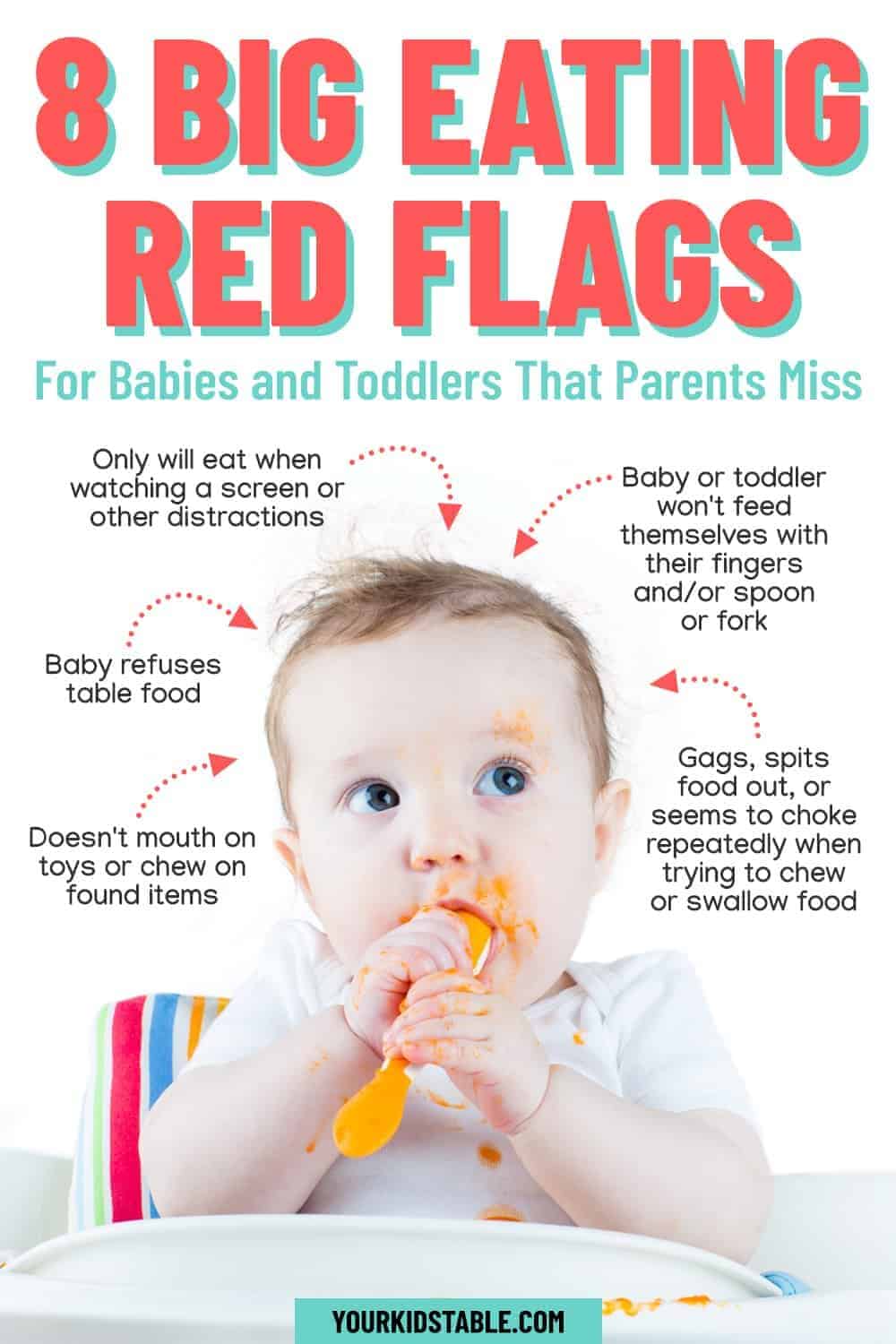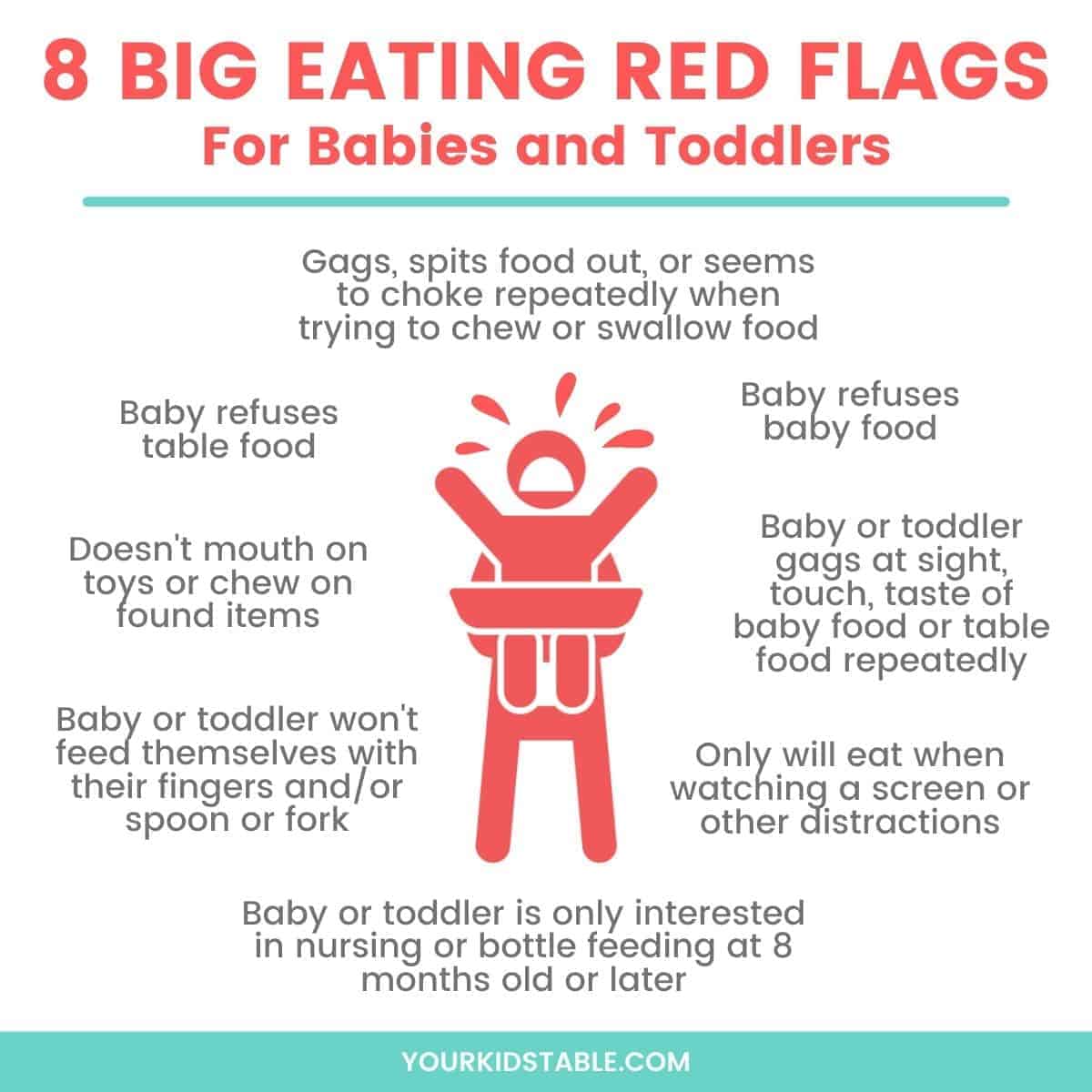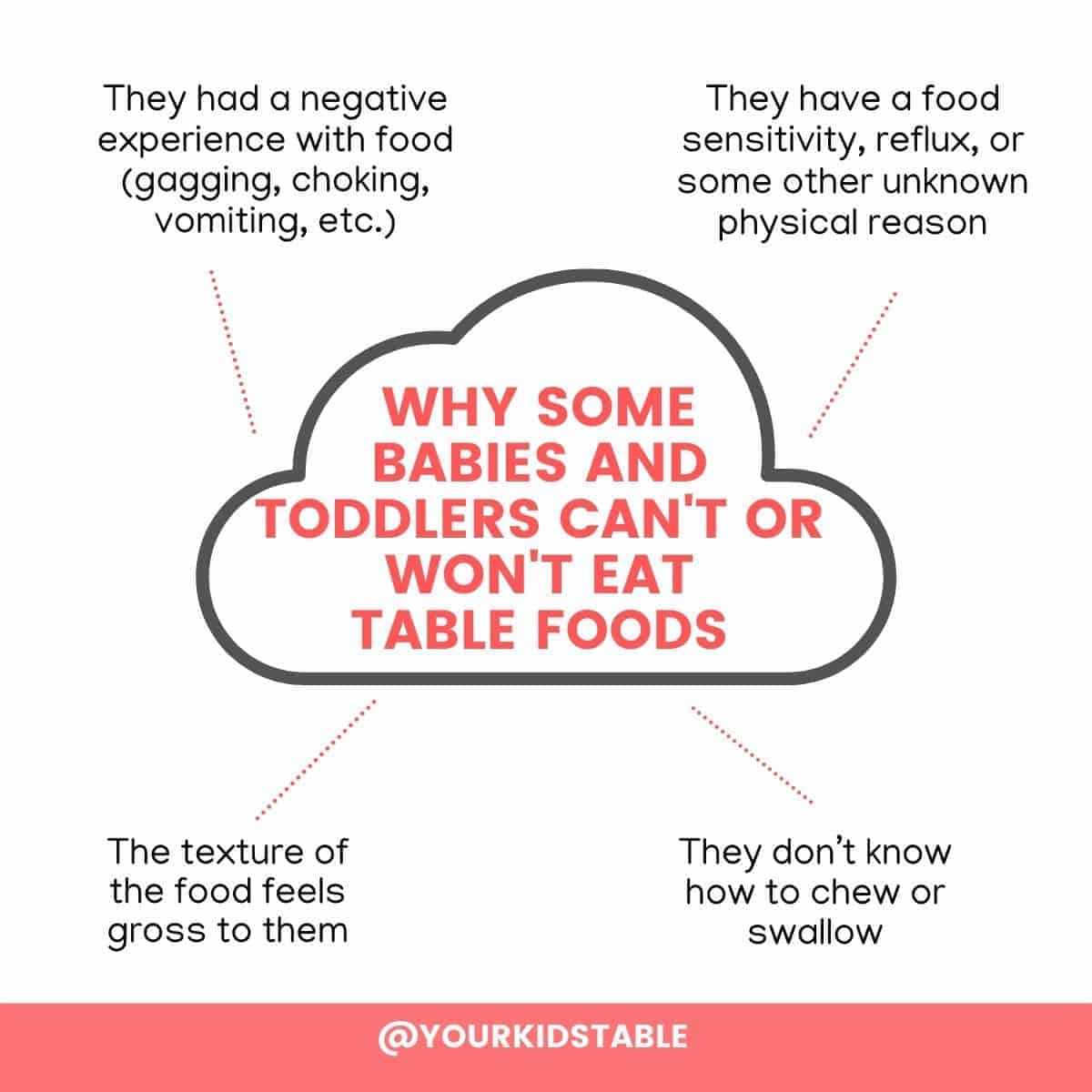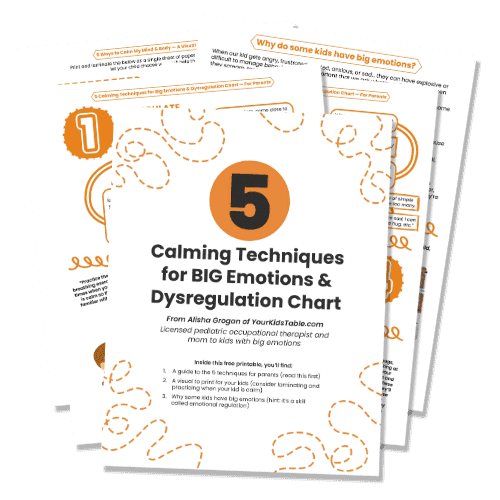Is your baby or toddler gagging on foods all of a sudden? Does your toddler chew food and spit it out? Or, your baby won’t put food in their mouth? Find out what’s normal and what’s not from a pediatric occupational therapist.
One of the most popular reasons parents find their way to Your Kid’s Table is because their baby or toddler isn’t eating baby food, table food, or both. Obviously, this is a huge area of concern for parents.
These refusals are usually a red flag that something deeper is going on with their eating, and if it isn’t addressed, it could lead to long years of picky eating and feeding difficulties that causes the whole family stress.
I’ve helped so many families of 2, 4, 6, 8, or even 12 year olds that are in a really desperate spot, and one of the first questions I ask (even for a 12 year old) is, “How did they transition to table foods?”
It gives me a clue as to how eating got so out of control! Because if a baby or toddler gagged a lot or started to all of a sudden, or if they refused to eat, it’s a sign that they have some difficulties that have caused challenging mealtimes for years.
I really want to help parents like you avoid that!
Let’s talk about 8 different feeding red flags for babies and young toddlers and what you can do to help your child.
8 Feeding Red Flags for Babies and Toddlers
#1. Baby Refuses Baby Food
Not all babies love the mushy pureed stuff, and many don’t gobble it down jar after jar the way other babies do. But, when a baby consistently refuses, and even becomes upset when presented with baby food, it is usually a red flag that there may be some sensory sensitivity.
While babies don’t need to eat baby food and can focus on table foods, it’s important for them to learn to tolerate using a spoon and eat purees like yogurt, soup, and applesauce as they get older.
Head to my baby won’t eat solids to learn a step-by-step plan to help your baby eat pureed baby food!
#2. Baby Refuses Table Food
Often, when babies refuse pureed foods, logically, parents will start trying table foods. In fact, that is just what I would recommend. However, if a baby is refusing pureed foods because of the mushy texture, they also may not be too keen on bananas or avocados.
Or, some babies love baby food, but want nothing to do with table food. There’s a way to help babies and toddlers transition to finger foods.
I always recommend starting with a dry and crunchy melt-able like baby puffs. If a baby is steadily refusing those and all other foods, then that is a clear indication that something else is going on.
View this post on Instagram
#3. Baby or toddler gags at sight, touch, taste of baby food or table food repeatedly
Some gagging when touching or trying new foods is normal, but if your baby or toddler does this every time, then it’s a strong indicator that they are sensitive to different textures. Or, yes, it’s possible your toddler gags at the sight of food alone.
This is because they’re imagining what that texture is going to taste or feel like.
It’s important (and very possible) to work with your child in a slow, but steady pace to help them desensitize to the textures that causing them to gag. Get an entire guide to toddler and baby gagging. You’ll find tips for how to move past it.
#4. Gags, spits food out, or seems to choke repeatedly when trying to chew or swallow food
There’s a difference between gagging when first interacting with a food and gagging when trying to eat.
Gagging or spitting food out after the baby has started eating tends to indicate that a baby may be having difficulty coordinating the actions of chewing and/or swallowing. These are called their oral motor skills.
Some babies and toddlers need help learning to chew.
At the same time, some babies won’t gag or spit out, but they’ll just hold onto the food, letting it sit in their mouth because they don’t know what to do with it or don’t want to swallow. This is called pocketing food.
#5. Baby or Toddler is only interested in nursing or bottle feeding at 8 months old or later
By 8 months old, at the very latest, babies should be showing some interest in some type of food (puree, soft table foods, or crunchy foods). If they don’t, despite repeated attempts, you would want to consider they have a texture sensitivity, oral motor difficulty, or a possible medical issue like food allergies, silent reflux, or a tongue tie, to name a few.
Make sure you talk to your pediatrician and see a pediatric GI to rule out any physical difficulties you might not be aware of.
#6. Baby or toddler won’t feed themselves with their fingers and/or spoon or fork
Sometimes, children aren’t able to coordinate the action of using a spoon or fork. Of course, I don’t expect a 6 month old to be able to feed themselves much, but they should be attempting to finger feed at a minimum.
When a child at 6, 9, or 14 months old refuses to feed themselves with fingers or utensils, it’s a red flag that they either can’t coordinate the movement required or that they’re too sensitive to textures so they’re avoiding getting messy or having utensils in their mouth.
Either way, you can learn how to teach your child to feed themself.
#7. Only will eat when watching a screen or other distractions
If a young baby or toddler is only able to eat by being distracted by a tablet, TV, phone, or a parent standing on their head trying to entertain them, then they again are lacking the intrinsic motivation to eat, which can happen for a variety of reasons. (See the big 5 reasons babies and toddler’s won’t eat.)
It’s a big bright red flag that something more is going on. Older toddlers and children can fall into this pattern for other reasons, but babies that have never been fed successfully another way, often need help to address the root of the problem.
Again, this is often underlying medical issues, sensory sensitivities, and/or oral motor difficulties.
#8. Doesn’t mouth on toys or chew on found items
I often hear from parents, “I thought it was so great that my baby never put anything in his mouth.”
On the surface, that does seem awesome, but there is a reason babies do that. It desensitizes their mouth to different textures, helps build their jaw, tongue, and lip muscles needed for eating, and they get to practice chewing. If your child never did this and has one of the other red flags, it is likely that there are some underlying difficulties.
Busted Myths About Babies and Toddlers Eating…
Myth #1: My baby isn’t eating because they don’t have teeth
If I had a dollar for every time I heard a parent say their child isn’t eating because they don’t have any teeth yet…. Well, you know how the rest goes! I hear this a lot, and I know that seems like good logic, but I want to shout from the roof tops: Babies and toddlers don’t need teeth to eat successfully.
Really, I’m not kidding!
Think about the first teeth babies get, which is anywhere from 6-14 months old. They are the front teeth. We don’t use our front teeth to chew, and babies shouldn’t be either. Their gums are strong and they should be chewing on them, right where their molars will be. It could be a year later before those molars come in.
Of course, the gums aren’t strong enough to chew steak or raw carrots, that’s why we don’t give those foods to babies.
Otherwise, babies and young toddlers were designed to eat successfully at meals without teeth.
Other foods they shouldn’t eat because they don’t have a teeth and are a choking hazard are:
- nuts
- lettuce
- popcorn
- other tough meats
- most other raw veggies like broccoli, cauliflower, and celery
They need teeth and more advanced chewing skills to manage all of those foods. Other than those tough foods and a few choking hazards like grapes and hotdogs, babies are able to eat a wide variety of foods without teeth.
Myth #2: They will grow out of it
I hear this A LOT too! But, it’s not from the parents of babies that are under 15 months old. It is from the parents of 2, 5, 8 year olds plus.
While some parents do arrive at this conclusion on their own because they honestly didn’t know what else to do, sadly, most of the time, parents had a gut feeling something more was going on, but their pediatrician told them, “Don’t worry, she is healthy, she’ll grow out of it.”
I’m not trying to knock pediatrician’s here, they are amazing and I have had the privilege of working with some amazing ones, both personally and professionally. Unfortunately, many receive very little advanced training in feeding difficulties that aren’t causing medical problems or weight loss.
If you see one of these signs, do some research, push for help, or tap into our resources here so you can be supported!
When it’s Time to Get Professional Help
Generally speaking, if your child has two or more of the red flags listed above, I would highly recommend getting a feeding evaluation, which is usually completed by OT’s (like myself) or speech and language pathologists. However, in a lot of cases, only one of these red flags is enough to warrant an evaluation.
If your baby is not eating any foods by 9 months of age or no table foods by 11 months of age, I would also strongly encourage a feeding evaluation.
More importantly though, if you feel like you don’t know how to help your child and something in your gut is telling you that there’s more going on, then get some help. You will be glad you did.
*Please keep in mind that babies born prematurely or present with developmental disabilities may be on a different timeline. Also, every child is unique and this information is tended to be a guide for parents to make decisions about potential interventions to help their child. If you still aren’t sure if your child needs more help, leave a comment below.
Where to Get Eating Help for Your Baby or Toddler
We specialize in helping babies and toddlers eat well. It’s so important to address it sooner than later because the older a child gets, the more ingrained the challenges become.
We have an online program designed for babies and toddlers struggling to eat table foods called Table Food School and another one for picky eaters called Mealtime Works. Plus, we have two free workshops:
- Click here for a free workshop to help babies and toddlers learn to eat table foods
- Click here to a free workshop to help picky eaters (toddlers and older)
If you’re in the states, you can also look into early intervention. What’s covered varies by state, but the evaluation is often free for kids 0-3 years old. Feeding therapy may also be an option. Check with your individual insurance company first to schedule at a private clinic, outpatient facility, or children’s hospital.
Learn to Eat Table Foods Printable for Babies and Toddlers
Want some concrete tips in your hand right now? I have a free printable that will help give you some direction and ease your worries. It’s for parents that are struggling to get your toddler or baby to eat table foods. I’ll send it right to your inbox:
Grab the Free When Babies Won’t Eat Table Foods FAQ Sheet right here!
More on Babies and Toddlers Eating
8 Tips for Nursing Moms Returning to Work With a Baby That Won’t Take A Bottle!
The Best 9 Month Old Baby Food + Table Food Ideas!
How to Teach Your Baby to Chew
Feeding Milestones for Babies and Toddlers
Alisha Grogan is a licensed occupational therapist and founder of Your Kid’s Table. She has over 19 years experience with expertise in sensory processing and feeding development in babies, toddlers, and children. Alisha also has 3 boys of her own at home. Learn more about her here.






Hello! I need some help or a clue. My toddler is now 17 months old. We have a hard time feeding him regular purées or regular table food. When he was 4 months and could sit up by himself, we tried him on purées for a while up until he was 7 months but he never took to the purées and would get angry about it when we tried to feed it to him. He would only eat about 5 to 7 small bites. At 7 months I started trying to feed him soft table foods because I thought maybe he would like it better but that wasn’t the case either. He has eaten a few cheerios, a few small pieces of chicken meat and gummed a piece of ham as an infant but nothing significant. We often can’t get him to repeat the behaviors. When we try to offer him foods he will refuse to touch or eat it and he walks away or just leaves it there as if he is grossed out. He chews on toys and lots of non-edible things like hair, paper, dirt, grass, bugs, etc and sometimes he will eat old stale food that he finds in a corner somewhere. I’ve been pureeing his food and putting it into a bottle and I have to make sure it’s not too thick or have lumps in it or he won’t eat it. He doesn’t qualify for feeding therapy through our insurance at this moment because he checked off everything on their list and ate two bites of food for the lady. Have you ever heard of this before? I need some advice. Thanks in advance!
Hi Lanee,
This is more common than you think but there are definitely things that you can work on. Have you done our table food workshop? I ask this because it’s a bit of a foundation for understanding the components of solids. But it sounds like sensory processing is a big part, so I’d also start with some oral sensory activities to help. Happy to answer questions as you check out these resources!
Best,
Laura
Your Kid’s Table team member
Hi! Thank you so much for this helpful content! My son is 11 months old. He does not put anything to his mouth at all but will take anything we put in his mouth. He does gag a lot while eating and sometimes gags so much that he vomits. He doesn’t really gag on stage one or two foods but does on stage 3 or table foods mashed. He does have acid reflux and has had milk protein problems. Any advice would be greatly appreciated!
Hi Hannah,
Thanks for reading. Have you read this article on gagging? This sounds like sensory and possibly oral motor issues going on, but that post is a great place to start, and you will find some next steps within it.
Best,
Laura
Your Kid’s Table team member
Hi! My 10 month old is having a hard time adjusting to table foods. He can’t eat purees past stage 1 without gagging. He recoils at the touch of table foods. He has also gagged so hard he’s vomited on any solid we’ve tried thus far. He will pick up small pieces of food, but will not attempt to put it in his mouth. Same goes for things he finds. For example, he will chew on teethers and large toys, but if he finds a small piece of paper let’s say, he won’t try to put that in his mouth. Which is nice, but as he’s my 4th child, I know it’s not the norm. I’m thinking this may require some sort of OT/Feeding therapy. Would I be off the mark there?
Thank you so much.
Hi Sammy,
Definitely doesn’t hurt to seek a referral especially when he would qualify for early intervention. I do not think you’re off the mark with this concern, and at this age they can progress really well! In the meantime, if you haven’t already, check out our free workshop on table foods that can give you a starting point.
Best,
Laura
Your Kid’s Table team member
Hi there, I have a 15 months old who was diagnosed with a tongue and lip tie at 13 months. We did the release right away. We have since tried to work on improving his oral motor skills. I can see that he has difficulties with chewing and swallowing as he will put food in his mouth, chew a few times and then spit it out. This happens often, however I know he is also able to swallow food other times. How can we desensitize and build his oral motor skills at this age ? He was never huge with chewing toys. Is he too early to use a tooth brush as mentioned by others above ? Also are we able to consult you privately and get OT services ? Thanks so much !
Hi Maya,
I’m glad you found us. Start with this article on building oral motor skills to see if it helps. It is definitely not too early to use a tooth brush or nuk brush- these can both help immensely.
Unfortunately there are rules and regulations on providing private services across state lines so private consult is no longer available, but if you explore our webpage we have many free resources, and several paid classes as well that have access to more specific help. Feel free to comment any questions here and I can direct you to appropriate resources.
Best,
Laura
Your Kid’s Table team member
Hey my girl is 8months she was diagnosed with pnemonia and since then she stopped swallowing solids she stuff in mouth and cry ave been to hospital to try get help but the medicine have not helped she can only breastfeed without problems lately she had oral thrush n still cannot swallow only one or two spoon n start crying
Hi Jackline, this can be very stressful, especially when there is a medical reason for feeding difficulties. Fortunately she is still breastfeeding well and at her age has a lot of time to build these skills. Read this article on helping build skills for table foods and see if it helps. Don’t lose heart!
Best,
Laura, Your Kid’s Table team member
Hello, my 2 year old son will not self feed and I have tried everything. You are the first website that actually had one of those listed and said there is more to it than just teaching them and I think that is true, I just don’t know where to begin.
Hi Dee,
Will he eat when fed by someone else? Or not eating much at all? Have you taken our free workshop on eating table foods? If you haven’t I highly suggest starting there. I am happy to continue to help if you try that and have questions!
Best,
Laura
Your Kid’s Table team member
Hey! I hope you are doing well. I really want some of your guidance and help regarding my 2 year old baby girl. She has done breast feeding and have always refused bottle so I have only breastfed her for about an year. After she turned 6 month old I started giving her purees and she was very much into purees so she was having different purees 3 times a day and a snack which was also a puree. But now she is 2 years old and still cannot swallow any chunk if I give her. I don’t have any idea what to do now how to make her chew and eat and do not vomit all the food she had earlier. If I will not give her puree food which is usually a cup full amount at a time then she would not ask for anything for about 7-8 hours or take anything in her mouth. What should I do should I suddenly leave all the puree and start giving her soft food? She gags and vomit everything if a little chunks goes into her mouth. She doesn’t even want to touch her food never touch anything which is sticky slimy or thick consistency. I do not want her to become weak that is the only reason I made her eat the way she wanted. She also eats when she is watching something. I have to spoon feed her and only smooth purees nothing else. She is not transitioning it. Help me please. How to transition her along with maintaining baby’s weight.
Hi Komal! Thanks for reaching out. There is definitely no need to fully stop purees until she learns the skills of chewing. But I would start exposing her to different textures so she can work on this. Start here, and if you search in the blog search bar, there are a few other articles on starting solids. Let us know how it goes, we do have further resources, but this is a great start.
Best,
Laura, Your Kid’s Table team member
Hi! I’m getting really worried about my 10 month old. Some meals he eats his purée absolutely fine, other times he cries at the sight of it and flat out refuses. He only has about 21oz of milk a day so he’s not filling up on it. My main concern however is that he absolutely will not put any food in his own mouth. He will put a spoon in his mouth and chew on it but only if there’s no food on it. He will put toys ect in his mouth but not food. If I try to put food to his mouth he will turn away and sometimes get really upset.
There are also times where he is clearly crying because he’s hungry but he’ll refuse food but then drink down a bottle fine.
How concerned should I be?
Hi Emma, I know this can be stressful. Does he have any preferred toys that you can put the smallest amount of food on? It’s a good sign that he’s putting things in his mouth, but I wonder if you could ease into it. If you have food sitting out in various presentations, does he interact with the food at all, like touching, etc? If you haven’t already, check out this article on transitioning to table foods and see if it helps: https://yourkidstable.com/how-to-transition-your-baby-or-toddler/
Best,
Laura, Your Kid’s Table team member
Hi Julie, very informative blog I must say.
I have an 11M old and she is not able to swallow solids, can drink formula or water and also purees, hummus, yogurt but 99% of the solid comes out from her mouth as if she doesn’t know how to swallow or has fear of gagging/choking. We have been asking our pediatrician this since she was 8months old and finally at 10month appointment, she referred us to feeding therapist.
We did and evaluation last week and as you mentioned one of the red flag was she doesn’t put anything in her mouth (toy or anything lying on the floor). We have been asked to desensitize her mouth using a electric oral stimulator and practice chewing using chewy tube. Also brush her teeth and gums twice a day. Reduced her formula intake to 22oz and she is offered solids first and followed by formula with the gap of 30min. And today we are going for her first therapy session
She can eat with her hands or with spoon (little help) and likes to eat solid food – no problem there at all. we dont turn on screen or any distractions so she can eat. Its just seating us in front of her and talking to her. She used to gag sometimes when seeing new food but not anymore.
How serious this problem is ? Will it gradually get better if desensitize her mouth and do chewing exercise ? Is there anything else that we are missing or could improve on? We feel so anxious specially during meal times but try not to show her that. I don’t know when we will see the light at the end of this dark tunnel.
Hi Mona! Thanks for reaching out! Try not to stress, children can definitely sense that energy and feed off of it. You are doing an amazing job! Take one day at a time. It is fantastic that you have already started feeding therapy, therefore, you are already getting a jumpstart on this issue. Without addressing the problem, issues like this only get worse. But with continued therapy and gradual desensitization, it can definitely get better and significantly improve! Keep doing what you’re doing, and with time, she should be able to eat without difficulty. You are not alone! If you ever need additional information, check out our free table food workshop.
Best,
Kalyn
Alisha,
I am a preschool special needs teacher. I have done this for 23 years and still love it. I am always learning new ways to help these little loves. I believe COVID really did a number on parents watching of children and seeing that they need help. I’m bursting at the seems with 12 babies.
My current research is on a little 3 years old boy. I have had him for all this year. He only makes vowel sounds and puts food in the back of his mouth to eat it, except gummies. Gummies are like addiction for this guy. You can not reinforce others with them without him crying that he isn’t getting one. He will tear the thin ones I am currently ecstatic if I get imitationa with extensions of himself such a sticks or puppets.
Nothing bilabial. He will watch me do lots of things when my lips come together
INTENSELY, but he will not put his on lips together and make a sound. HELP!
My child used to eat between 8 -10 months but now he has stopped at 15 month i.e., from 10 -15 months , he being fed and force fed.
Whenever he is hungry he only wants to munch on snacks which he asks from other members of family and mostly learns from his 5 yr old sister. He has an appetite but does eat what we offers easily and we end up feeding him forcibly, so once he is full he is happy else he cranks.
if I decide to follow 3 keys and not to force the food primarily, how do I
make sure he is full and happy. if dont allow others to feed him , how he will full if he is not on his own at all or even with just 2 -3 bites ?
Hi Shrut! It is very important not to force-feed. The more we pressure children to eat, they often push back and do the opposite. You decide what your child eats and your child decides how much. Try implementing a feeding schedule, where you offer food every 2-3hrs; breakfast (2-3hrs), snack (2-3hrs), lunch (2-3hrs), snack (2-3hrs), dinner. During those 2-3hr gaps, only offer water. This will hopefully allow your child to feel hungry enough to want to eat more than a few bites at mealtime. Hope that helps!
Best,
Kalyn
Hi, my son who was born 2/22/22 is going on 1 yrs old and around Xmas time he started gagging more so then often (has a few teeth and is still teething) and then one taste of mashed potatoes on xmas day he projectile vomited. He had surgery on Dec 30th and was put under for little more than circumcision and I was really stressed about the gagging as I started to think my he got somthing stuck in his throat. I het him checked a day before, they said he was fine. Fast forward to healing time weeks later still gagging alot to the point where formula would hit his tongue and it was like he was choking. See Dr and said try gentlease only which he was already on but die to the shortage we had to get the same form but other brands. We try just that for a few weeks it calmed down ate baby food fine and the gaging slowed. It came back a little stronger, switch formula again and he was fine but now it seems the little foods he’s eating that he liked as soon as it hit his tongue he’s back to gag/choking (not in his mouth food just touched toungue) and now projectile vomiting more so now. Now it seems almost everything except he’s still drinking similac sensitive and eating his cereal puffs with himgers and shows interest in food with no problem, now present week shoving all food away and even gave medicine and projectile vomited again. The drs say his tonsils are big but even tho I’m pushing for an allergy test and maybe tonsils removed they’re not really taking what I say seriously. He is my 5th child and I habe stomach ulcers and Gerd and had to take stomach meds while pregnant and im concerned as he’s not progressing food wise as he should be. No fevers no other symptoms is happy after throwing up its mind blowing. I try teething wafers which melt just like puffs and he enjoys a few minites eating himself as I watch and then suddenly vomiting. I am at my wots end as I do not know what to do except for keep pushing for the drs to do somthing and keep trying. He is ahead on motor skills and even in height and weight which is common on my side as my family is very tall and that’s exactly how they were. If I can get any feedback or advice I would greatly appreciate it bc I feel so sad for my poor baby as he’s missing out and I’m afraid his forst birthday he won’t even be able to enjoy his baby safe made cake among other things. Also I have tried tummy meds, soy milk, 2 percent the only thing that’s next is whole milk but he just doesn’t seem interested as even warming bottles was useless bc he would refuse to drink them. Thank you to whoever took the time to read this I appreciate your time, Jessica.
Hi Jessica! Thanks for reaching out and sharing your journey- so sorry it’s been so stressful for you! I assure you, you are not alone in this. First, if you feel like your son’s doctors are not listening to you or your concerns, definitely try to find a new doctor. It’s so important for you and your son to feel cared for and important. Plus, second opinions can be very helpful! It sounds like he has some sensory/gag issues, for sure. Try some oral motor exercises to work out those mouth muscles and desensitize his gag reflex. Things like: brushing the sides of his mouth with a toothbrush, chewing on teethers, licking popsicles, blowing raspberries, and demonstrating chewing (making over-exaggerated chewing motions, showing him how you eat/chew/swallow). For more help, I highly encourage our free table food workshop, which walks through teaching baby how to progress with solids. Save your seat here!
Best,
Kalyn
Maybe try getting him OFF of Similac! Similac is the worst formula you can give. Please read about Similac, it’s not good. Please look into Hipp formula which you can get from Switzerland, it’s 100% European organic, non GMO. You can order online and believe it or not, they are pretty quick on shipping! My sister and I both had babies born in 2022 as well and this formula has been the best by far for both of them.
Please give it a try, as I’m sure baby will be very pleased. Good luck!! I hope your baby gets better soon! 🙂
That’s bullshit. There’s something else going on with thus child. Similac has nothing to do with the problem. It could be sensory issues. Don’t be so narrow minded.
My son easily stopped bottle feeding and started baby food went from stage 1 to 3 gaged and vomited on couple things but ate the others no problem then I started to puree table food same thing gaged and or vomiting on a couple things then went to some finger foods and few fine chopped up food and continued the gaging and vomiting and started to refuse to eat anything new and slowly started to refuse to eat the stuff he liked before getting agitated and very upset even crying at the slightest attempt to get to eat even holding something out in your hand and asking “do you want some” is answered with a very firm “no” while also swiping it away even if i sneak and try to wipe a little bit on his lips for a small taste in hopes to convince him to try it he starts
crying, gags, and or vomits the only thing he will eat is cool ranch dorritos, gold fish, sliced cheese, grapes, fruit snacks, and candy ive talked to my pediatrician she said at first to try not giving him those things and only give him other things at feeding times and if he didn’t eat let him go hungry for a day because he wouldn’t starve himself and would eventually eat what i set infront of him i tried this for the whole day and he refused to eat anything when it became time for bed i gave in and gave him the foods he would eat before bed time because i refused to let him go to bed hungry I went back to the pediatrician and explaind to her i could not bring myself to let my child go to sleep hungry because I personally felt it would be abusive to let him go all day without eating then going all night hungry then she said ” as long as he continues to gain and stay at a healthy weight that it was nothing to worry about and he would correct it on his own and that I should give him a extra vitamin supplement everyday but he is almost 3 years old now and still nothing has changed and I and beginning to become very worried something more might be going on and at what point could this effect his overall health
Hi Nate, this can be very stressful. Have you taken our free eating webinar? You can sign up and watch at your own convenience and it may really help to build a strategy for increasing foods. Sign up here.
Best,
Laura
Your Kid’s Table team member